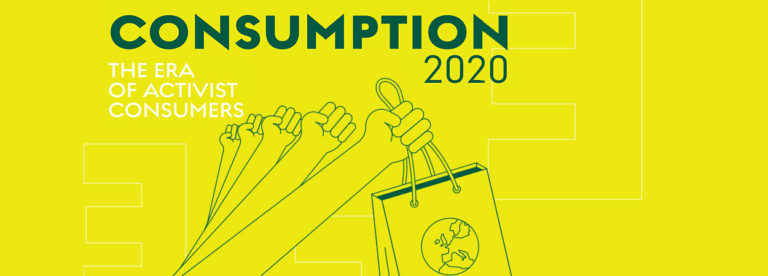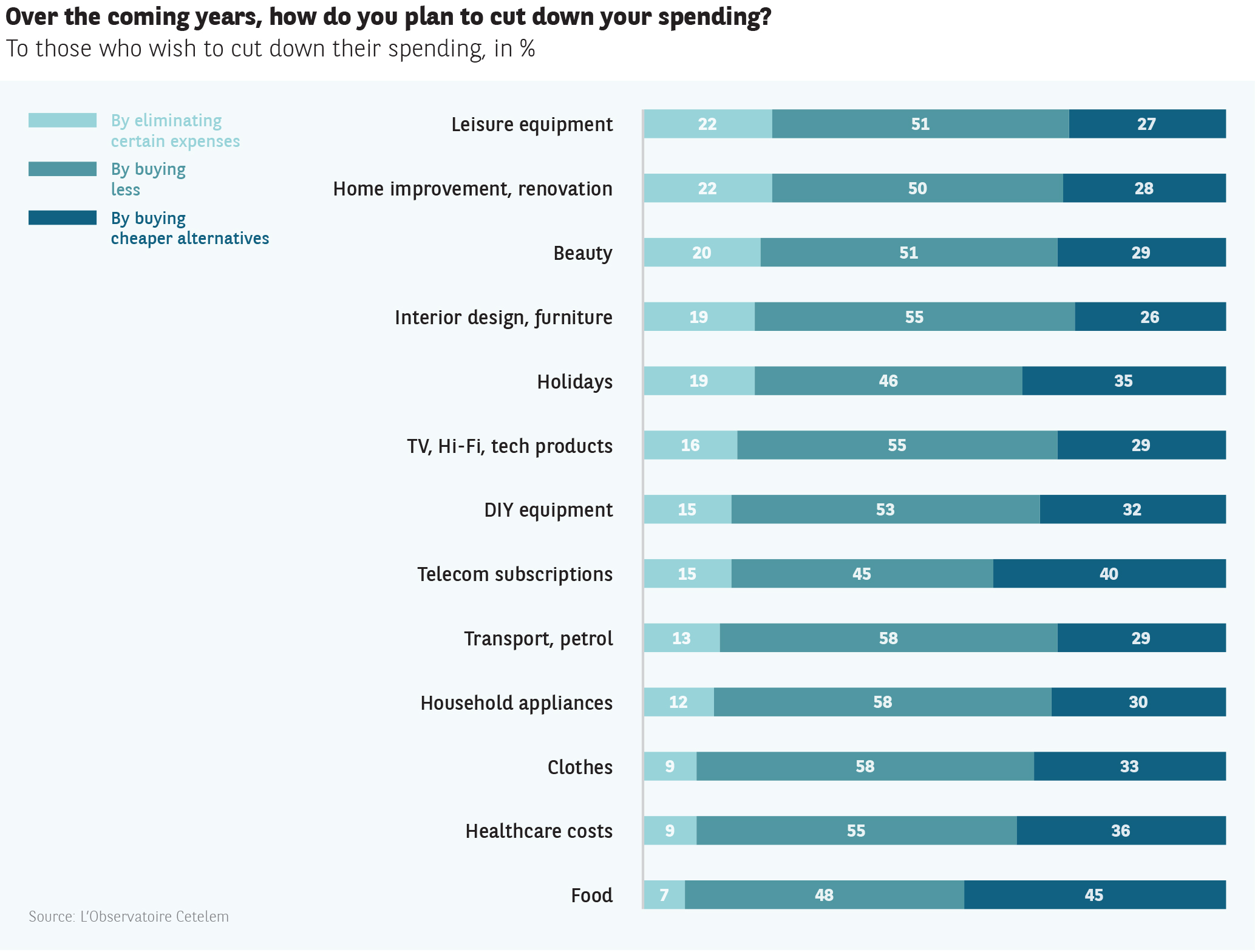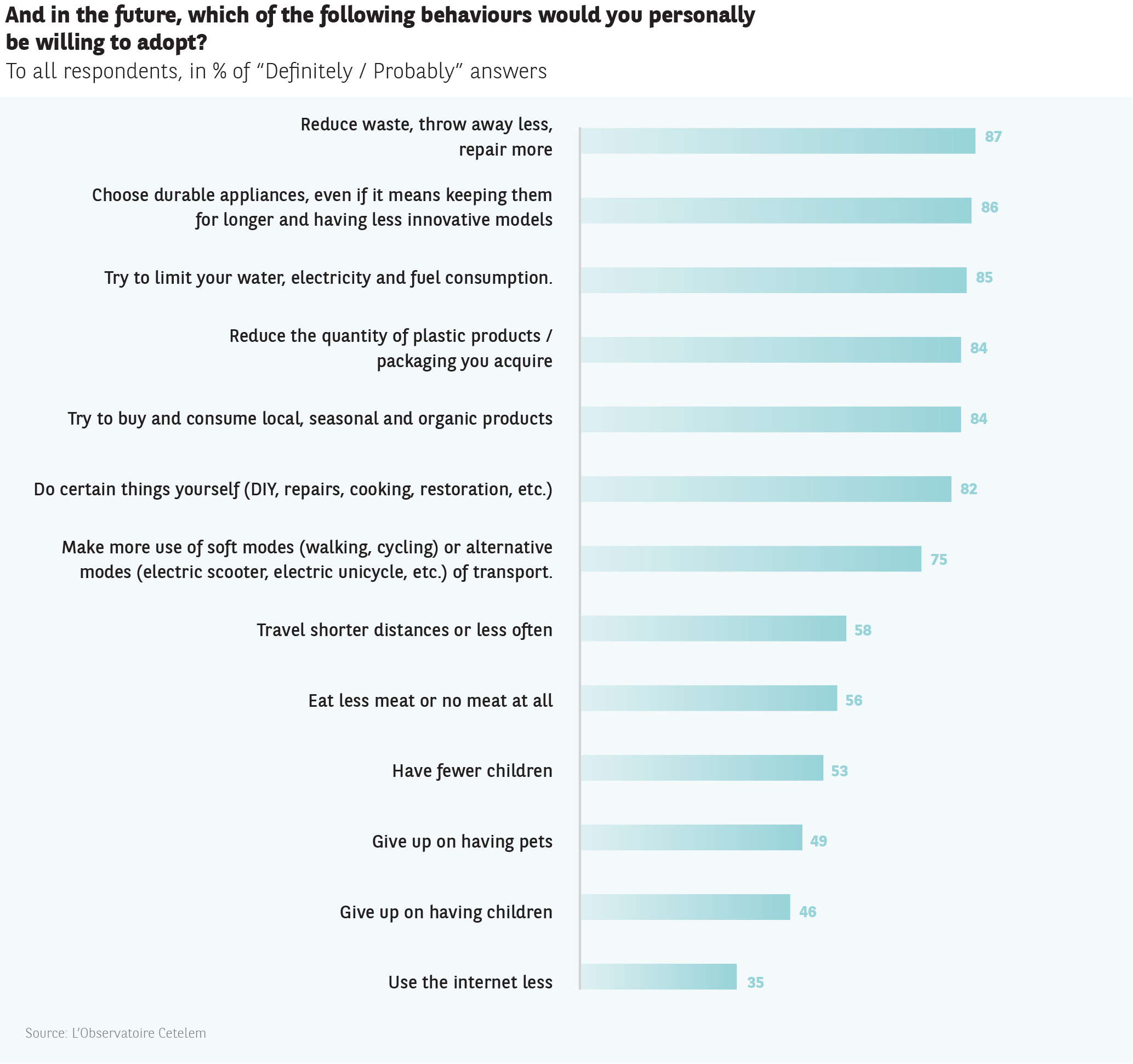Consuming less and differently


NO SECTOR IS SPARED
This shift in consumption patterns will prompt a reduction in spending that is set to affect all sectors significantly (Fig. 26). Of those who are keen to save money, almost half intend to do so by buying less, rather than by stopping consuming altogether or choosing cheaper alternatives. in other words, they want to make fewer purchases without sacrificing quality.
While transport, household appliances and clothing are the expenses most likely to be squeezed by those looking to save by making fewer purchases (58%), sectors that are usually shielded from this are also affected. Whether it be holidays (46%), telecoms (45%) or even food (48%), Europeans do not intend to stay passive, signalling a major change in consumer behaviours.
Geographically speaking, one country stands out from the rest: France.
More than any other population, the French are eager to save by making fewer purchases.
Conversely, inhabitants of Eastern European countries, particularly Slovakia, prefer to save money by eliminating purchases or opting for cheaper alternatives.
It is worth noting that, with the exception of transport and household appliances, on which millennials are significantly less likely than seniors to want to reduce their spending, there are no tangible generational differences.
FIG. 26 :
A trend towards activism
Fast-fashion, which revolves around frequently updating one’s wardrobe at a low cost, has lost some of its lustre.
For the second successive year, sales volumes are down in France. Geoff Rudell, an analyst at Morgan Stanley, believes that the global clothing market has peaked and that its decline is structural. This is chiefly down to its environmental and social impact, which consumers are increasingly unable to accept. Like the slow-food and low-tech markets, slow-fashion is emerging as a counterweight to traditional consumer behaviour. This is a way of being fashionable while consuming in a more informed way by opting for certain products, such as those offered on SloWeAre, the leading slow-fashion platform.
In 2019, nearly half of the Europeans surveyed declared that they had bought “respectful” fashion items, i.e., recycled, organic or second-hand textiles.
(Source: Institut Français de la Mode).
TURNING RESPONSIBILITY INTO SUSTAINABILITY
As well as reducing their purchases, Europeans are prepared to take various kinds of action to cut their consumption (Fig. 27). And here again, their commitment is clear, confirming the emergence of a potent form of activism driven by heightened environmental awareness.
In particular, responsible consumption will be virtually inseparable from the concept of sustainability.
87% of Europeans intend to waste less, repair more and be careful not to throw items away unnecessarily.
Similarly, they are very keen to buy more durable appliances that they will keep for longer, even if it means doing without the latest products (86%).
They also intend to set themselves limits, for instance in their use of plastic (84%) and in their consumption of electricity, water and fuel (85%). 3 in 4 Europeans also want to use more soft modes of transport and 58% want to travel shorter distances and less frequently.
As regards food, the preference will be for local, organic and seasonal products (84%), while the majority want to reduce or even eliminate their consumption of meat.
A standard examination of geographical trends reveals a quartet of countries whose intentions are the most resolute, mainly in favour of more sustainable and less energy-intensive consumption: Portugal, Italy, France and Hungary.
Seniors are determined to waste less, to use their appliances for longer, to consume organically and locally, and to reduce their consumption of water, electricity and petrol. Millennials are more likely than average to want to curtail or eliminate their meat consumption.
EVEN THE MOST PERSONAL CHOICES ARE IN QUESTION
The behavioural changes being considered also have an emotional dimension. More than 1 in 2 people would be prepared to have fewer children or even to give up on the idea of having children altogether, with demographic consequences that could aggravate the economic problems countries face. An almost identical proportion are prepared to forego having pets.
The second area of focus also has a relational slant.
Only 35% of Europeans plan to use the Internet less.
the importance digital technology has gained thanks to social media, but also as a consumption tool, explains its position in this ranking.
It is hardly surprising that millennials overwhelmingly reject this prospect.
A trend towards activism
The 7th continent is a source of worry and fear. The thousands of square kilometres of plastic waste that are drifting around the oceans are prompting consumers to alter their habits and governments to take action. On 12 June 2019, the European directive banning the sale of certain singleuse plastic products was published. As from 3 July 2021, straws, cotton buds, coffee stirrers, cutlery and plates will be banned outright in the European Union. Plastic bottles will be required to contain at least 25% recycled plastic by 2025 and 30% by 2030, while 90% of bottles will need to be recycled by 2029. These are numbers that are easy to remember and which symbolise Europe’s commitment to the cause.
FIG. 27 :


